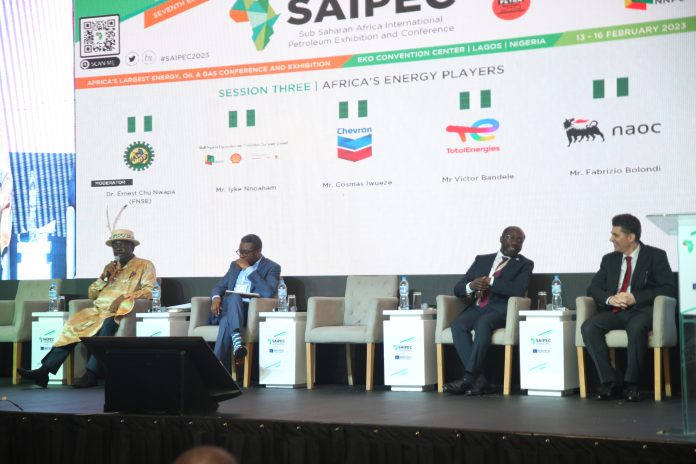The Deputy Managing Director, TotalEnergies in Nigeria, Victor Bandele with other Panelists at the Occasion.
TotalEnergies aims to be known as the responsive, broad energy company in Africa.
The Deputy Managing Director, TotalEnergies in Nigeria, Victor Bandele, made this known during the International Oil Companies, IOCs, Panel Session at the 7th Sub Saharan Africa International Petroleum Exhibition and Conference, SAIPEC, the third panel session last week Tuesday in Lagos.
“We will be known as the responsible, broad energy company in Africa. This is linked to very thoughtful development of natural resources, the strength of our operational network, and our strategic investment in renewable energy. We will be known on this continent as the partner of choice for our ability to listen and connect with our customers”, he said.
He listed the Company’s ambition to include: a responsible approach to fossil energies: focusing on value by selecting low-cost developments that are the most efficient in terms of greenhouse gas emissions, reaching the top three companies worldwide in low-carbon LNG, setting the standard for decarbonizing the oil and gas value chains and profitable investment, in order to become one of the top five producers of renewable electricity (wind and solar) in the world.
Others are becoming a leader in the mass production of clean hydrogen, being a partner in our customers’ carbon neutrality and being recognized in the market for electric mobility as currently in fuel distribution.
“At Exploration and Production, E & P, our strategy is being responsible, responsive, and resilient”, he added.
Responsible: safety is a core value at the heart of our operations, avoiding and reducing our greenhouse gas emissions across the Company’s operated and non-operated facilities, reducing absolute methane emissions from operated oil and gas assets by 50% between 2020 and 2025, and by 80% between 2020 and 2030, reducing routine flaring on operated facilities to less than 0.1Mm3/d by 2025, with the goal of eliminating it by 2030 and gradually change the production mix towards more gas and LNG.
Responsive: maintaining our competitive advantage on technical costs, and getting the maximum from our assets through operational excellence, delivering projects on time and within budget. New projects must be compliant with low carbon footprint.
Resilience: capitalizing on our strength: strong legacy positions in Africa, Middle East, and Northern Europe, areas of technical excellence in deep and conventional offshore, and LNG and high-grade asset portfolio through a dynamic portfolio management, getting maximum benefits from short-cycle investments.

Panelists at the event
“We have continued to drive investments towards a sustainable and secure energy future for Africa through Operational Efficiency that is increasing profitability by finding new resources, optimizing design to conform with lower operational cost, and improving performance through digital and automation of our processes.
Improving our asset operational efficiency is the immediate and perhaps economical, first step adapted in reducing emissions in our portfolios. Process efficiency reduces repeated production interruptions, process restart and the resultant gas flaring/venting required to safely depressurize our upstream facilities during emergency shutdowns”, he stated.
Low Carbon Mix: Lower the carbon intensity of energy, covering the gas and LNG value chain, renewable.
New Prodcuts: this requires that we explore differentiated products to support new business opportunities with regards to polymers, lubricants, fluids, and fuels as well as support the diversification in base chemicals.
Speaking further, he said, “A year on, Oil and Gas remain the pillar of everyday society, how are the IOC’s ensuring energy is delivered to the people of Sub-Saharan Africa, whilst looking forward to achieve the global energy transition pledges”
He noted that Oil & Gas industry occupies an advantaged position in the energy transition in Africa. It has the finance, the people, the technology, and the experience. “For TotalEnergies, our company is always committed to working with the government and other stakeholders to actualize the Nigerian government’s goal of net zero emission by 2060. TotalEnergies’ own target for net zero is 2050”.
“Our path to net zero will involve investment in renewable energies, investments in gas developments as gas will serve as transition energy, producing low emission oil as we eliminate routine gas flaring in our operations and our plastic recycling plant in Port Harcourt eliminates about 750, 000 cubits of C02 annually, which is equivalent to planning 4,500 trees”, stressed the DMD.
“We have made important investments locally in these areas and implemented several initiatives that are already impacting the Nigerian energy landscape positively. Some of these include: in recent years, our projects in Nigeria have been sanctioned with the objective of driving down our green-house gas emissions; and pursuing a zero-flare principle on all our new projects as is evident with OML58 Upgrade, Ofon Phase 2, Egina, and Ikike, our investment in the NLNG from the beginning till now is partly derived from our commitment to the production of cleaner and better energy”, he maintained.
“Out of our over 530 service stations across the country, more than 112 have been solarized. It’s an ongoing programme and our target is to ensure that our stations become fully solarized. We have also deployed over 150 residential solar solutions across the country and over 1.5 million people in Nigeria have been impacted from sale of 400,000 TotalEnergies solar lamps since 2013, according to Global Lighting Off-grid Association estimates. Worldwide, 10 million people have been impacted”, he noted.







